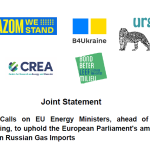Centre and conservative parties of the current European Parliament have failed to treat climate change with the urgency it demands, according to a new ranking published today by Climate Action Network (CAN) Europe. At the same time, national champions in these groups demonstrate that centre and conservative parties can play a positive role in climate policy-making and that climate action can become a cross-party priority in the upcoming European elections.
The report “Defenders, Delayers, Dinosaurs: Ranking of EU political groups and national parties on climate change” assesses the voting behaviour of current MEPs in relation to climate and energy issues. It reveals which political parties, both European and national ones, act to protect Europeans against climate change. With the information from this report in hand, Europeans are equipped to vote for candidates from those parties which support climate action in the upcoming European Parliament elections in May.
Five out of eight EU political groups score badly or very badly in the report. The Europe of Nations and Freedom – ENF (15.2%), the European People’s Party – EPP (14.3%) and the European Conservatives and Reformists – ECR (10.0%) come at the bottom of the ranking with a very low score of less than 25%. They have acted as Dinosaurs who have not yet grasped the need for action against climate change and as such prevent others from doing more. The Europe for Freedom and Direct Democracy – EFDD (40.9%) and the Alliance of Liberals and Democrats for Europe – ALDE (38.1%) come next with a relatively poor score of less than 50%. They have acted as Delayers who generally support climate action, but do not act with the required urgency.
Only the Greens/European Free Alliance (84.9%), the European United Left/Nordic Green Left (66.5%), and the Progressive Alliance of Socialists and Democrats – S&D (61.3%), score ‘good’ or ‘very good’, acting as Defenders, fighting to protect Europeans against climate change.
National champions in centre and conservative groups demonstrate that these groups can play a positive role in climate policy-making and that a broad alliance of MEPs taking this challenge seriously in the next Parliament is possible. For example, the ALDE group champions include the Portuguese Democratic Republican Party (PDR), Croatian Istrian Democratic Assembly (IDS-DDI) and Belgian Reformist Movement (MR), with scores of over 60%. The Portuguese Earth Party (MPT) and Belgian Humanist Democratic Centre (cdH) advocate for more climate action in the EPP.
Commenting on the results, Wendel Trio, Director of Climate Action Network (CAN) Europe said:
“In the last five years conservative and centre parties in the European Parliament have not done enough to stand up for European citizens and protect them from the climate crisis. They need to listen to millions of European voters demanding that politicians do more to fight climate change, make climate their top priority in the elections campaign and commit to take concrete steps after the elections. Several conservative and liberal politicians in the current Parliament take the challenge of climate change seriously and support more climate action. We need more of them in the next European Parliament to build a broad alliance of MEPs across the political spectrum fighting for a cleaner, safer and more prosperous Europe.”
ENDS
Ania Drazkiewicz, CAN Europe Head of Communications, ania@caneurope.org, +32 494 525 738
Notes
Climate Action Network (CAN) Europe is Europe’s leading NGO coalition fighting dangerous climate change. With over 150 member organisations from 35 European countries, representing over 1.700 NGOs and more than 47 million citizens, CAN Europe promotes sustainable climate, energy and development policies throughout Europe.



